
Search
While the COVID-19 pandemic has pushed international development organizations to make greater use of digital tools that help field teams stay connected with customers, even as their work is curtailed for safety, the trend towards digital coordination in ICT4D gained momentum long before the Coronavirus outbreak.
TaroWorks and its technology partner Mogli Technologies, whose Salesforce App uses SMS and WhatsApp to facilitate communications and manage business operations in emerging markets, outlined a few trends in digital coordination software development and use during a webinar presented several months ago. We were joined by Stevan Simich, Mogli’s CEO and Founder and Mogli COO, Rob Blatchley. Webinar attendees also got a look at case studies exemplifying some of the trends in action.
When TaroWorks started, we saw the need for basic mobile data collection – information collection in the field that could be analyzed at headquarters to report on operations or report to donors and investors. This function existed in one or two job roles within an organization so technology could easily be applied to those roles. Now, organizations are looking for technology that can match an organization’s scope and complexity and there is a need for data to be used and analyzed for many different reasons by many more groups within a business.
As a result, the need for standalone apps are gone. There is more of a need for the digital coordination that comes with integrated apps across the platforms so that different parts of an organization can continue talking to each other and therefore scale, which is in many cases the goal of international development organizations – to scale their impact.
Beyond monitoring and evaluation, we’re also seeing a lot more organizations who are delivering services and products to customers in the last mile using a standard set of operating procedures. As a result, this idea of being able to track automatically when one stage of a process is completed so that the next person in the supply chain can complete their related task is increasingly important as well.
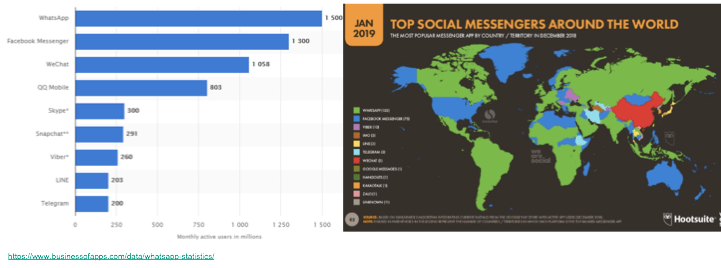
“We’re seeing obviously a proliferation of different communications apps … the biggest one at the top of the list here which covers the map pretty well (in green above) is WhatsApp (with) 1.5 billion users around the globe,” Stevan, Mogli’s CEO, said during the webinar. “For you to stay relevant on a fundraising level for you to engage certain stakeholders (and) more importantly to be able to engage your base of people that you’re potentially serving, the place to meet them is where they like to communicate and obviously that trend has really been moving internationally towards Whatsapp.”
Mogli client African Leadership University (ALU), a Mauritius and Rwanda-based educational institution whose goal is to train “3 million entrepreneurial, ethical leaders for Africa,” needed a way to communicate with its diverse group of undergraduate and graduate students. The digital coordination goals included to:
Mogli has incorporated the WhatsApp messaging app into ALU’s Salesforce CRM to allow the organization to track conversations with students from a central location in the cloud. Templates are created to offer standard messages to WhatsApp users and there’s also the capability of engaging in live two way discussions.
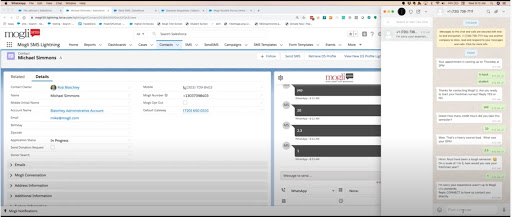
Rob, Mogli’s COO, said ALU was particularly interested in using WhatsApp and Salesforce to conduct surveys of students. For example, once a first year student has opted-in to take the survey over WhatsApp, they might be asked how many course credits they had taken that semester. If they responded “20”, Mogli analyzes the response and returns a message “Wow, that’s a heavy course load. What’s your GPA?” After a series of additional questions and responses, the student is asked to rate their freshman year at ALU on a scale of 1-5.
The WhatsApp responses populate the Salesforce database in what Rob called a “question response record.” The database of responses allows Mogli to launch various automations based on survey results. For example, if the student answered “1” to the question about rating their freshman year on a scale of 1-5, a message can be generated to the student’s advisor that the student may be at risk for not coming back to school the next year. Salesforce can also aggregate all of the student’s individual questions and responses in dashboards that spot trends and help manage student-administration contact.
The question our clients grapple with is do you try to build a customized system that does everything or do you find these already developed tools that are very specialized and link them together. The second approach makes the case for platforms like Salesforce, which is a cloud-based CRM and data analysis system that has a robust market of compatible apps like TaroWorks that extends Salesforce to offline use in remote areas and Mogli which harnesses SMS and WhatsApp for two way communication through Salesforce to the field.
“What we have seen in the eight years that we’ve been in business, we started out agnostic (about) the platform but very quickly went completely to Salesforce and are a part of the ‘Lord of the Rings’ if you will,” Stevan said during the webinar. “We believe that having one platform that can do all sorts of things really does set the stage for the ultimate goal … which is around gathering that data to do quick and easy impact measurement for reporting to boards of directors (and) to internal marketing teams. Those things can be really powerful and efficient when you’re running with tight small teams that are being overextended and limited resources, having that extra investment into one platform can actually pay off an efficiency and sort of peace of mind for your staff managing really diverse operations that need to be systematized.”
TaroWorks client Sistem.bio is a social enterprise, which sells biodigester systems that farmers throughout rural Mexico, Latin America, East Africa and India use to turn farm waste into organic fertilizer and to replace wood and LP gas with a natural energy source.
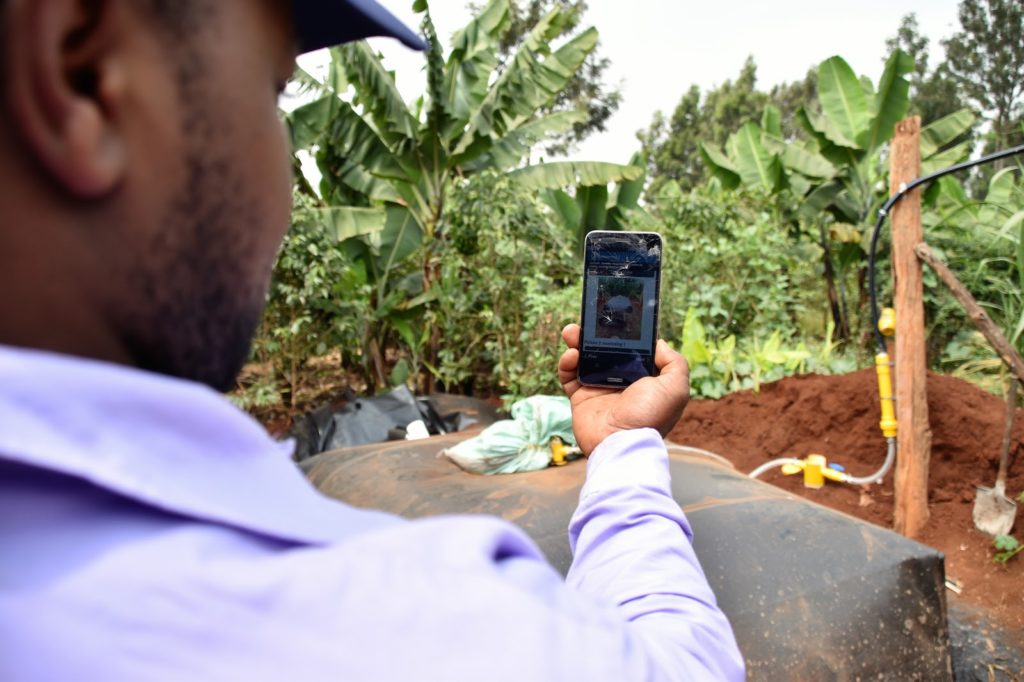
With a range of stages and people involved in the manufacture, sale, installation and maintenance of such waste-to-energy systems, digital coordination is complex, especially in rural areas where internet or mobile data connections are not easily accessible. Sistemo.bio is using TaroWorks and Salesforce to coordinate processes across a variety of roles including:
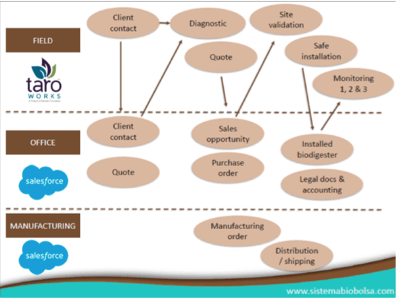
As a global operation with many moving parts, Sistema.bio is also using TaroWorks and Salesforce to coordinate visibility of stock levels for biodigesters at warehouses and can use our mobile offline field service app to track and manage:
SMS capability is used to automate the process of connecting with biodigester customers about product payments they need to make when taking advantage of consumer financing offered by Sisteam.bio. Customers making these payments are spread across large geographies. Among the types of messages sent to each farmer:
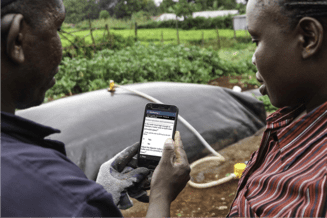
POST TOPICS
Sign up to receive emails with TaroWorks news, industry trends and best practices.
TaroWorks, a Grameen Foundation company.
Site by V+V